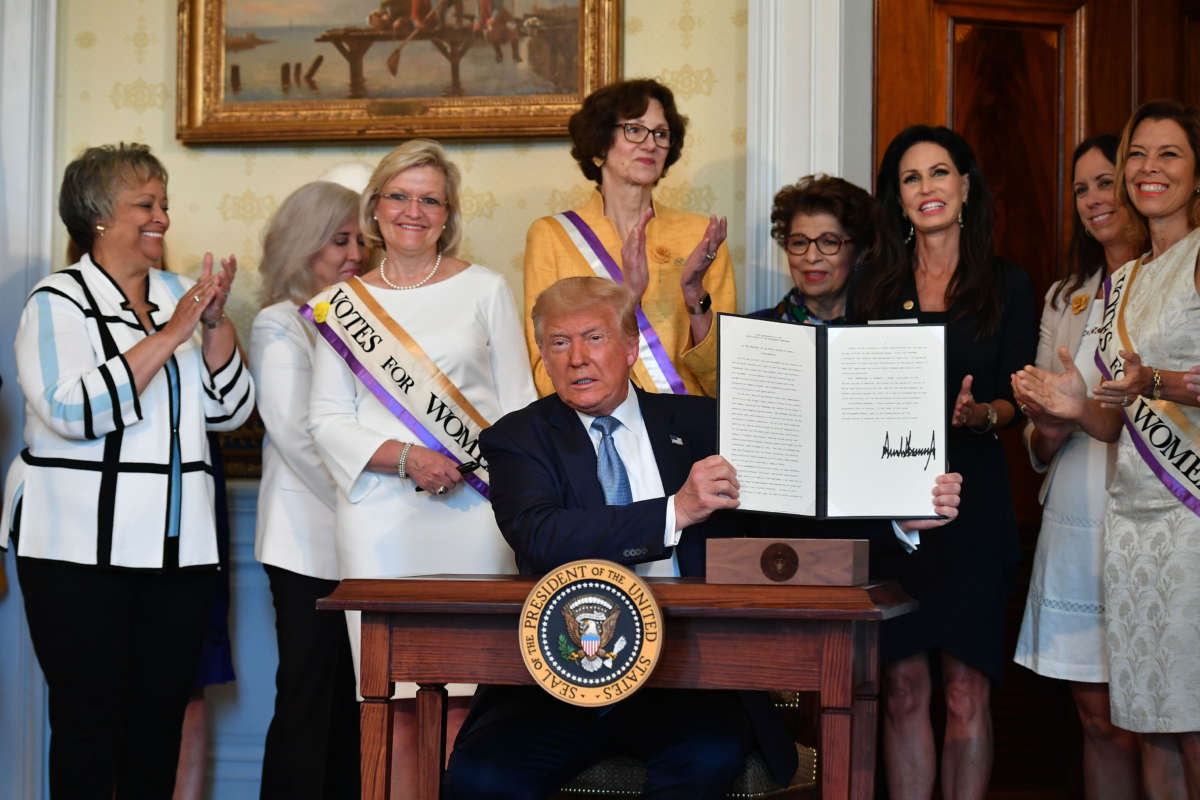President Donald Trump has announced plans to pardon Susan B. Anthony, a suffragist, who was charged for voting illegally in 1872. He announced the pardon at an event commemorating the 100th anniversary of the 19th Amendment that granted women the right to vote in 1920.
In November of 1872, Anthony persuaded election officials to allow her to vote in the presidential election. Shortly after, she was arrested — and, at her trial, was adamant that her crime was only unjust under “forms of law all made by men, interpreted by men, administered by men, in favor of men, and against women,” she said. She was ordered to pay a $100 fine, but never paid the fine or went to jail.
Her crime brought attention to the issue of women’s suffrage at the time, though the amendment wasn’t ratified until after her death.
Anthony, as well as the 14 other women who voted with her, had committed a planned act of civil disobedience — which some interpret to mean that she would not have wanted to be pardoned. Former California representative Katie Hill tweeted, “Susan B. Anthony did not want to be pardoned. She was very pointed about this. Not until all women had full equality.” Hill then quotes Anthony saying at her trial that she would “urge all women to … the old revolutionary maxim that ‘Resistance to tyranny is obedience to God.’”
Susan B. Anthony did not want to be pardoned. She was very pointed about this. Not until all women had full equality (which we still don’t have).
She said instead she would “urge all women to… the old revolutionary maxim that ‘Resistance to tyranny is obedience to God.’”
— Katie Hill (@KatieHill4CA) August 18, 2020
Others have noted that, though Anthony fought fiercely for women’s right to vote, she also perpetuated racism throughout the movement, sidelining Black civil rights leaders like Ida B. Wells and Mary Church Terrell. Terrell even believed that, if given the chance, white suffragists would not grant Black women the right to vote in the 19th Amendment, according to The New York Times. When the 19th Amendment was ratified, it, indeed, mostly benefited white women, leaving women of color behind until the mid to late 20th century.
Trump’s pardon of Anthony comes at a time when he is consistently polling behind Biden; CNN’s Poll of Polls finds Biden leading by nine points as of Monday. The pardon is likely an attempt to appeal to women voters. The Trump campaign has sent a pink “Women for Trump” bus to various key states like Pennsylvania and Michigan, aiming to attract more women voters. And, at the pardoning event, Trump championed the 19th Amendment, saying that it “was a monumental victory for equality, for justice, and a monumental victory for America.”
But Trump has a history of misogynist remarks that could undermine that appeal. Last week, Trump resurrected his sexist “nasty” woman retort, aimed at Kamala Harris after she was announced as Joe Biden’s running mate. Also, attacking Biden and affordable housing, Trump recently tweeted that the “suburban housewife” would be voting for him, which, on the heels of the Harris announcement, many viewed as racist and sexist.
Join us in defending the truth before it’s too late
The future of independent journalism is uncertain, and the consequences of losing it are too grave to ignore. To ensure Truthout remains safe, strong, and free, we need to raise $33,000 in the next 2 days. Every dollar raised goes directly toward the costs of producing news you can trust.
Please give what you can — because by supporting us with a tax-deductible donation, you’re not just preserving a source of news, you’re helping to safeguard what’s left of our democracy.
